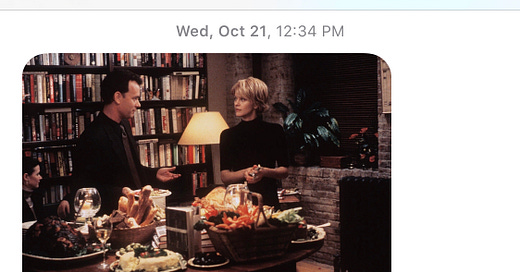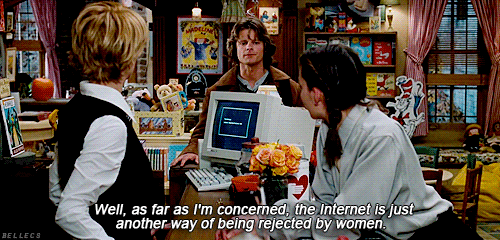links: Eileen Jones + Broey Deschanel
Two film critics on You’ve Got Mail, Sofia Coppola, Shakespeare, and Clintonism.
Welcome to today’s links, where we take a closer at the weird corners of the film world // links are sent on the occasional Sunday //
Eileen Jones
I first encountered Eileen Jones’s writing when Andy texted me an essay she wrote for Jacobin, a magazine about politics, economics, and culture from the American left, titled “The Romance of American Clintonism.” “Really appreciate this piece as a 90s kid whose mom used to incessantly watch this movie,” he texted. “Shiiiiiiiiiit, I can’t wait to read this,” I texted back.
Jones’ piece revisits You’ve Got Mail's rom-com plot, where Tom Hanks character with his mega-chain of bookstores drives his love interest, Meg Ryan, and her independent children’s bookstore out of business … only to end up happily in love? She highlights how ‘90s mainstream romances about fighting, or at least resisting, the Man — Reality Bites (1994), Empire Records (1995), Jerry Maguire (1996), Titanic (1997) — showcased a “principled defense of small business” as a form of rebellion. Until it fizzled out in 1998, as Jones write:
Still, defiance of one kind or another was the norm in this genre until, as far as I can tell, You’ve Got Mail hit theaters. That was the genius of the film’s appeal: it was not only a clever and captivating love story, but also a fantasy that spoke to the neoliberal subject’s thorough exhaustion with politics and yearning for acquiescence without punishment. To the extent that it was even happening, resistance didn’t seem to be working. What if you didn’t have to resist anymore, and nothing was lost? What if “the Man” turned out to be Mr. Right?
It does seem to say a lot about our politics that the story of a man continually lying IRL and online to the woman he loves and then destroys the business her mother left her and we consider it a romance, right? But it was the ‘90s, lol!
I’ve since become a fan of Jones’ work for Jacobin (she has an incredible piece on John Carpenter) and subscribed to Filmsuck, her podcast on “the rotten state of cinema, its generally crap politics” on Patreon. I’m currently listening to the episode “Sophia on the Rocks” where they do a take-down of Sofia Coppola’s Apple+ release, On the Rocks.
Broey Deschanel
Speaking of Sofia Coppola, the next link is to a YouTube video titled “Sofia Coppola: The Politics of Pretty” by video essayist Broey Deschanel. In it, she examines Coppola as a “pioneer of the delicate, the beautiful, the gloom of being female.”
The essay pushes back the criticisms of the “vague and often-used term ‘girlie’” and the other sexist undertones from largely male critics towards Coppola’s films, particularly The Beguiled, Marie Antoinette, and The Virgin Suicides, and examines how Coppola examines society from the perspective of privileged white women, as problematic as that perspective may be.
What ties The Beguiled, Marie Antoinette, and The Virgin Suicides, together is that they occur during a moment of rupture, at the breaking point of a society in decline. Yet they’re always told from the privileged side. With The Beguiled, we get the Civil War from the point of the white women living in the Confederacy. With Marie Antoinette, it’s the French Revolution through the eyes of its most infamous monarch. And with The Virgin Suicides, we’re told the story of a conservative, white-middle class suburban family as the decline of Detroit motor city occurs in the background.
But what sets these films apart is that they’re deliberately a-historical. When Coppola chooses to situate her stories in a particular socio-historical moment, she narrows the lens. Her politics are all about the personal is political. So rather than epic, historical dramas, we get psychological ruminations on self-hood, identity, and female adolescence.
It’s a must-watch for all Coppola fans. I also really loved her examination of the concept of “low culture” in “When Shakespeare Got Cool.”
You can follow her YouTube channel at Broey Deschanel.
If you liked this post, please hit the heart button below! // It helps us reach more readers on Substack // Also, tell a film-loving friend to subscribe.
Follow me on Twitter // Read more of my writing: nicjuarez.com





